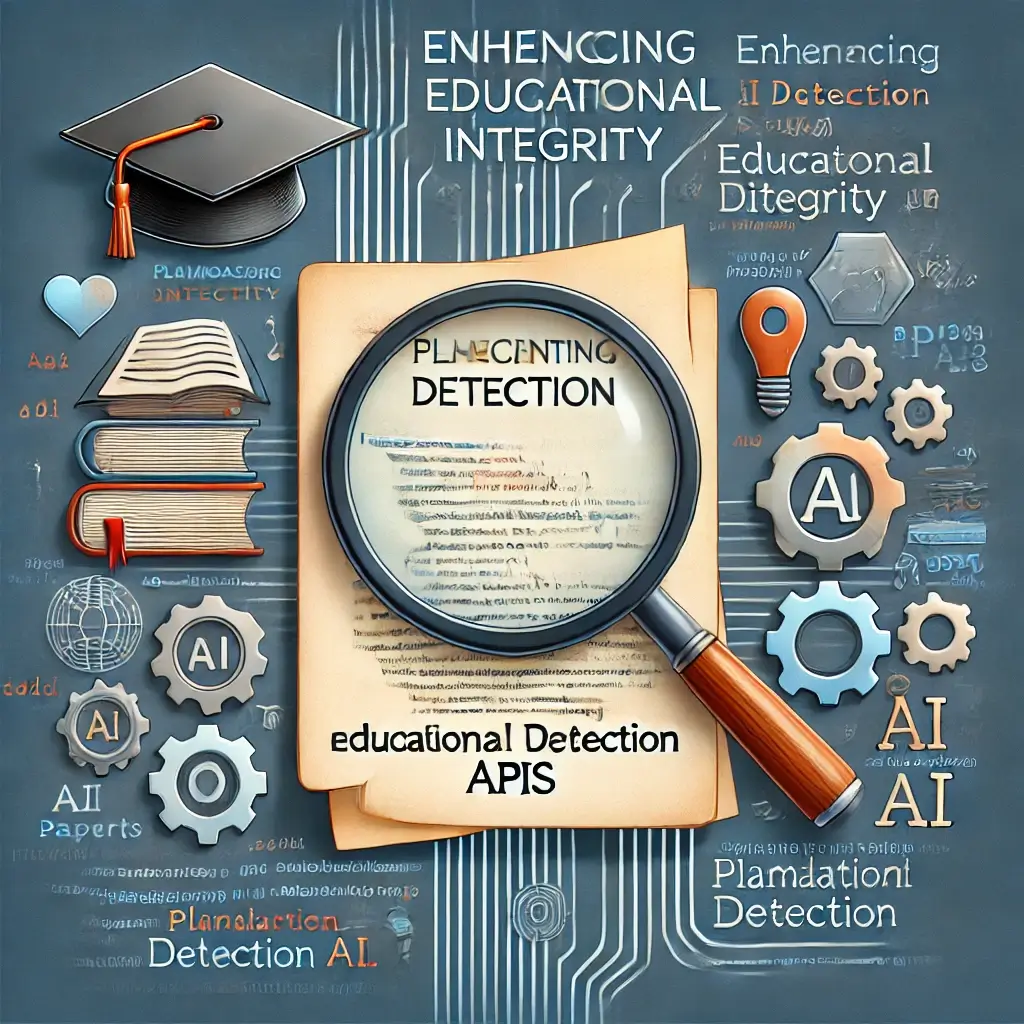Maintaining educational integrity has become a challenge in academics. The internet has made every type of information easily accessible. Many students use this facility and incorporate existing research in their work without attribution. This necessitates an advanced solution to catch learners’ dishonesty and prevail in an ethical academic environment.
In this situation, plagiarism detection APIs emerge as a robust solution against unfair use of someone else’s material. They act as companions of institutes in stopping one of the major academic misconducts: plagiarism. In this article, we will see how these technological creations help enhance scholarly honesty and discuss how colleges and universities can make the most of them.
However, before that, let’s first understand the plagiarism checker API and how it works. So, are you ready to embark on an informative journey? Let’s get started.
What Is Plagiarism Detection API?
API stands for application programming interface and refers to a particular set of protocols. It aims to connect two software programs to share data, enabling two platforms to communicate seamlessly.
The word API combined with plagiarism detection hints at a software interface integrated with educational platforms such as learning management systems. It provides a facility for other software to access plagiarism assessment capabilities and perform real-time scans. Once integrated with third-party software, it doesn’t leave any plagiarized document undetected.
How Does Plagiarism Checker API Work?
A plagiarism checker API assesses the file step-by-step when analyzing a document’s originality. As it detects the input text, it thoroughly examines each sentence and understands the context. A sophisticated API utilizes the power of artificial intelligence and machine learning algorithms to scan the entire document deeply.
Then, it compares the text under observation with a vast database enriched with billions of academic resources. Lastly, it accurately identifies the plagiarized parts and generates an easy-to-understand report. Many APIs provide you control over several factors, such as detection depth, language settings, report formatting, and similarity threshold.
How Do Plagiarism Detection APIs Promote Educational Integrity?
Plagiarism detection APIs enhance academic integrity in many ways. Let’s examine how they promote scholarly honesty.
Identifies Unnoticed Similarities
Many students unintentionally plagiarize their work when working on assignments. This often happens when some of their sections match others without their intentions. This creates accidental plagiarism, but the learner remains unaware of it. However, when they submit their document through the platform integrated with the plagiarism detector API, the unintentional similarities get detected. The API instantly finds every sentence that resembles an already existing material. This instant feedback allows students to review their work again and make needed changes to make their files free from plagiarism.
Promotes Respect For Original Authors
The institutes expect their students to respect authors’ time, energy, and resources when creating original work. However, many knowingly steal material from reputed writers and researchers and incorporate it into their academic writing tasks. However, their dishonesty is revealed when they upload their document to the learning management system powered by a plagiarism checker API. The API flags externally sourced content as plagiarism and requires the proper citation of the sources. This increases the awareness among learners that they must show respect to original creators by crediting them for their contributions.
Enhances Fairness In Grading
Without an efficient originality assessment solution, it is hard for educators to know whether an assignment is copied or created. This may lead to unfair grading, awarding dishonest learners, and discouraging hardworking researchers. However, when plagiarism detection APIs are integrated with educational systems, they enhance fairness in grading by providing accurate feedback on the uniqueness of the text. It helps teachers to ensure that only those students who put effort into creating unique work are given good grades. This builds a positive academic environment where learners’ hard work is recognized.
Encourages Academic Research
When colleges and universities integrate a proficient plagiarism detection API with their system, it alerts the students that their work will be assessed for originality. As a result, the learners try their best to avoid unethical practices such as exchanging material or copying content from the Internet. Rather, they conduct comprehensive research on the topics and gain sufficient knowledge. Inspiring others’ work enables them to do their assignment using their thoughts, ideas, and opinions. The consistent use of APIs develops the habit of researching things online in the student, which encourages them to create original content.
Helps Maintain Academic Reputation
APIs capable of detecting copied work greatly help institutes maintain their reputation in the academic world. They commit to academic excellence by strictly passing every submission through an API. Integrating their LMS with a sophisticated application programming interface enables them to catch plagiarism cases before they circulate among students, teachers, or other institutes. This allows them to ensure that the graduates from their institutions are seen as trustworthy. By stopping academic dishonesty and meeting the standards of scholarly integrity, institutes can earn respect in academia.
Promotes Ethical Practices
When the content assessment system of institutes is weak, students care less about the originality of work. When learners don’t fear that their assignments will be checked strictly for plagiarism, they don’t hesitate to engage in unethical practices. Conversely, when education centers get their hands on plagiarism detector APIs, they signal to the learners that every submission will be checked across a vast database. This forces them to avoid content scraping and focus on producing original assignments. Consequently, they stopped academic dishonesty and used ethical practices to create original written work.
Why Institutes Should Rely On Plagiarism Detector APIs
Here are some solid reasons that make it essential for institutes to utilize a plagiarism checker API with their systems:
Compliance With Educational Policies
Institutions operate under national and international educational policies. These principals demand every college or university to take strict proactive measures against academic misconduct. Integrating the plagiarism detection API helps them stop one of their major educational offenses. That’s how an API helps institutes comply with academic standards.
Automated Content Assessment
One of the main benefits of an API is that educators don’t have to spend hours manually checking the originality of students’ tasks. Everything gets done in seconds, providing ease to teachers. The automation enables institute instructors to focus on feedback, grading, and teaching instead of burning time and energy in manual reviews.
Greater Accuracy In Evaluation
Another reason institutions must rely on plagiarism checker APIs is because these software interfaces improve work evaluation accuracy. Whether it is slightly paraphrased text or patchwork, they can detect plagiarism in different forms with high precision. This makes the originality-checking process of institutions more efficient and result-focused.
Best Practices To Integrate APIs Into LMS
When integrating a plagiarism detection API into a learning management system, it is essential to adopt the right approaches. The following practices will help you to take the maximum advantage of APIs:
Check The Compatibility First
Before integrating an API, ensure it is compatible with your LMS. This ensures the API supports the same programming language used in your learning management system. Also, it must be well-documented and easy to implement without disturbing other tools in your system.
Configure Automated Checks
Once you merge it with your LMS, you can customize its functionality. In this regard, the first thing you need to do is automate the detections. This eliminates the need to pass every document individually through the assessment process. Also, this setting provides quick feedback on submission, allowing students to improve their work before the deadline.
Set The Depth Of Detections
The tolerance level of plagiarism varies in different institutes. A feature-rich API lets you set the detection depth according to your institution’s policies. So, use this facility and configure the API to flag the work plagiarized when the similarities exceed your pre-defined threshold. This makes the text evaluation fair.
Customize The Report Options
Another important thing you need to do is customize the report settings. For instance, you can set the access to reports and configure the API to display a download option to let students save the plagiarism report. This helps learners revise their assignments on time and verify that their work doesn’t contain any kind of plagiarism.
Adapt To Updates Timely
When using an API within your LMS, make sure to update both of them whenever needed. This lowers the chances of integration issues and allows you to capitalize on the latest features of an API. Moreover, the updates improve your database, which leads to more accurate detections.
Wrapping Up
In short, plagiarism detection APIs enhance academic integrity by discouraging the unfair use of information. Their accurate content evaluation ensures that only original work is promoted and stolen content is penalized. After reading this article, we hope that you have understood the role of these application programming interfaces in encouraging scholarly honesty. So, we hope that you will use a reliable API for your institute to meet academic rules and regulations.
Additionally, when implementing such technologies, it’s crucial to have the right development team to ensure seamless integration into your educational system. If you’re looking to hire developers from India, you can tap into a vast pool of skilled professionals who can help you create or incorporate plagiarism detection tools into your existing platforms effectively and affordably.
After reading this article, we hope that you have understood the role of these application programming interfaces in encouraging scholarly honesty. So, we hope that you will use a reliable API for your institute to meet academic rules and regulations.









